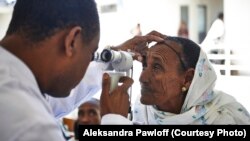A new study adds to growing evidence that HIV-infected people have immune systems similar to those who are much older. This occurs even when they are being treated with antiretroviral drugs. The older-acting immune systems can make them more susceptible to certain diseases.
Dr. Douglas Jabs said while HIV/AIDS patients are living longer than ever – thanks to antiretroviral drugs – they are at greater risk of developing age-related diseases. These include cardiovascular disease, cancer, diabetes and even frailty.
Jabs is lead author of a new study that says they are also more susceptible to age-related macular degeneration or AMD. The disease can cause vision loss and blindness in its late stages. AMD is listed as the “leading cause of visual impairment and blindness in people over 65.” It causes damage to part of the retina called the macula, which is responsible for clear, sharp vision.
Jabs is a professor of both ophthalmology and medicine at the Icahn School of Medicine at Mount Sinai in New York.
He said, “There is an emerging body of data in the HIV literature that patients with HIV infection, who are treated with antiretroviral therapy and have immune recovery – so now they’re not getting opportunistic infections – they have markedly improved survivals – they all have a shortened survival relative to patients who are not HIV infected when you age match them.”
They appear to have – what’s called – accentuated or possibly accelerated aging.
“In addition, the immunologists are showing that the immune system of patients with HIV, who are treated with antiretroviral therapy and immune recovered, have changes similar to the immune systems of 75-year-olds called immunosenescence,” he said.
Jabs and his colleagues studied more than 1,800 HIV patients between the ages of 13 and 73 from 1998 to 2011. The study says their immune systems were always activated and they had chronic inflammation – a condition that’s been linked to a number of health problems. In a sense, their immune systems had a lot of wear and tear.
“They’ve had a lot of immune stimulation. They’ve got a lot of cells that are responding to the things that they’ve seen. But they’re losing some of the ability to respond to new challenges," he said. "When with the immune activation they have systemic levels of inflammation using simple biomarkers. Those pieces of information suggested that because of the accelerated aging and because of the issues related to inflammation and immunosenescence that maybe patients who are HIV infected would have similar age-related changes in the eye. And so we decided to look for AMD.”
When compared to a group of people of similar ages not infected with the AIDS virus they had a fourfold greater prevalence of macular degeneration.
‘We looked at all the different drugs they’re taking. It’s not related to the drugs. It’s not due to the drugs at all. It’s due to the beating the immune system has taken dealing with HIV and everything else," he said. "And it’s similar by the way to what the immune system looks like in a 75-year-old adult, except these people are all 45.”
The next step, said Jabs, is to try to understand what’s going on – to determine whether chronic activation of the immune system and systemic inflammation are actually the reasons for greater risk of AMD. In the meantime, he said the message is one of vigilance – manage diseases in HIV patents the way they would be treated in older individuals.
